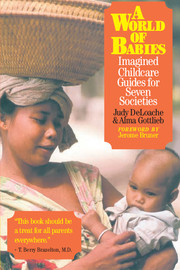Book contents
- Frontmatter
- Contents
- Foreword
- Editors’ Acknowledgments
- Note to the Reader
- CHAPTER ONE If Dr. Spock Were Burn in Bali: Raising a World of Babies
- CHAPTER TWO A Parenting Manual, with Words of Advice for Puritan Mothers
- CHAPTER THREE Luring Your Child into This Life: A Being Path for Infant Care
- CHAPTER FOUR Gift from the Gods: A Balinese Guide to Early Child Rearing
- CHAPTER FIVE Making Babies in a Turkish Village
- CHAPTER SIX Infants of the Dreaming: A Warlpiri Guide to Child Care
- CHAPTER SEVEN The View from, the Wuro: A Guide to Child Rearing for Fulani Parents
- CHAPTER EIGHT Never Leave Your Little due Alone: Raising an Ifaluk Child
- Note to Chapter One
- About the Contributors
- Authors' Acknowledgments
- Citations and Sources Cited
- Index
CHAPTER SEVEN - The View from, the Wuro: A Guide to Child Rearing for Fulani Parents
Published online by Cambridge University Press: 05 September 2014
- Frontmatter
- Contents
- Foreword
- Editors’ Acknowledgments
- Note to the Reader
- CHAPTER ONE If Dr. Spock Were Burn in Bali: Raising a World of Babies
- CHAPTER TWO A Parenting Manual, with Words of Advice for Puritan Mothers
- CHAPTER THREE Luring Your Child into This Life: A Being Path for Infant Care
- CHAPTER FOUR Gift from the Gods: A Balinese Guide to Early Child Rearing
- CHAPTER FIVE Making Babies in a Turkish Village
- CHAPTER SIX Infants of the Dreaming: A Warlpiri Guide to Child Care
- CHAPTER SEVEN The View from, the Wuro: A Guide to Child Rearing for Fulani Parents
- CHAPTER EIGHT Never Leave Your Little due Alone: Raising an Ifaluk Child
- Note to Chapter One
- About the Contributors
- Authors' Acknowledgments
- Citations and Sources Cited
- Index
Summary
THE FULANI OF WEST AFRICA
The Fulani (also known as the Pula, Peul, and Fulbe) constitute one of the largest ethnic groups in West Africa. Numbering about 10 million, they are distributed across the southern edge of the Sahara Desert in a broad east-west belt of savannah that includes open woodland interspersed with grassland. The largest concentration of Fulani is found in northern Nigeria, where they are intermixed with settled Hausa people, but they also constitute minority groups in most other countries of West and Central Africa, including Mauritania, Senegal, Gambia, Guinea-Bissau, Guinea, Sierra Leone, Mali, Niger, Burkina Faso, Côte d'Ivoire (Ivory Coast), Togo, Ghana, Cameroon, the Central African Republic, and Chad. The Fulani speak Fulfulde (which belongs to the West Atlantic group of Sudanic languages), as well as the languages of their “host” countries. Most Fulani are practicing Muslims.
Because they are scattered over a vast area, inhabiting many different countries and leading somewhat diverse lifestyles, it is difficult to pinpoint exactly who “the Fulani” are. For convenience, the Fulani can be roughly divided into three major groups based on the degree to which they adhere to their traditional, pastoral way of life. The first group comprises the nomadic or pastoral Fulani, who regularly move with their families in search of optimal conditions for their herds of cattle. For example, in the dry season (roughly September to May) the Fulani of northern Nigeria travel south with their herds to avoid drought and to find adequate grazing land.
- Type
- Chapter
- Information
- A World of BabiesImagined Childcare Guides for Seven Societies, pp. 171 - 198Publisher: Cambridge University PressPrint publication year: 2000
- 8
- Cited by



